 Petzlover
Petzlover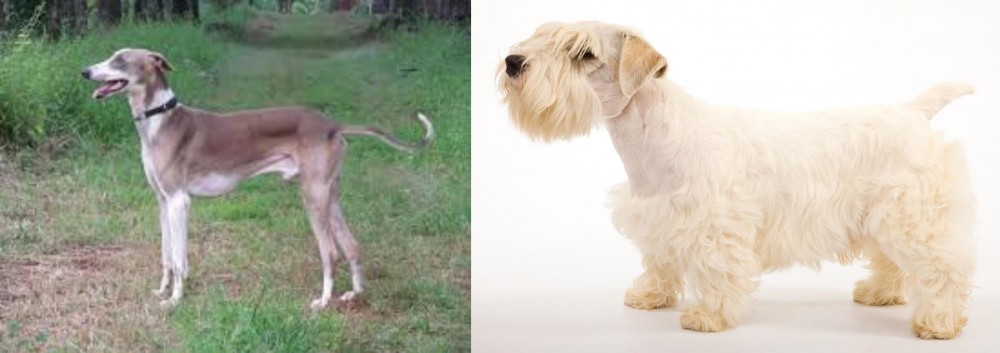 Mudhol Hound is originated from India but Sealyham Terrier is originated from United Kingdom. Mudhol Hound may grow 42 cm / 17 inches higher than Sealyham Terrier. Mudhol Hound may weigh 18 kg / 40 pounds more than Sealyham Terrier. Both Mudhol Hound and Sealyham Terrier has same life span. Mudhol Hound may have more litter size than Sealyham Terrier. Both Mudhol Hound and Sealyham Terrier requires Moderate Maintenance.
Mudhol Hound is originated from India but Sealyham Terrier is originated from United Kingdom. Mudhol Hound may grow 42 cm / 17 inches higher than Sealyham Terrier. Mudhol Hound may weigh 18 kg / 40 pounds more than Sealyham Terrier. Both Mudhol Hound and Sealyham Terrier has same life span. Mudhol Hound may have more litter size than Sealyham Terrier. Both Mudhol Hound and Sealyham Terrier requires Moderate Maintenance.
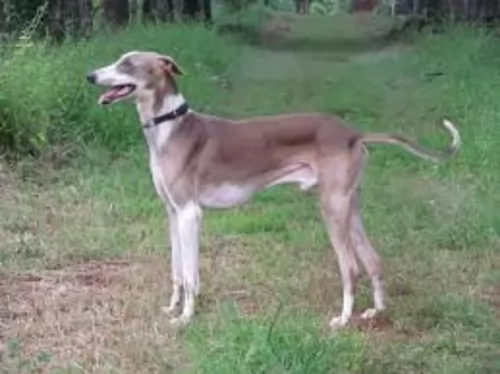 This seems to be the breed of many names. The Mudhol Hound comes from India and has been called the Caravan Hound, the Pashmi, the Karvanit, the Karwaani and the Pisuri Hound. Like so many other Indian breeds, the Mudhol Hound bears a strong look of the Greyhound. He is a sight hound and as such is lean and fast. He is ancient, healthy and loves his people.
This seems to be the breed of many names. The Mudhol Hound comes from India and has been called the Caravan Hound, the Pashmi, the Karvanit, the Karwaani and the Pisuri Hound. Like so many other Indian breeds, the Mudhol Hound bears a strong look of the Greyhound. He is a sight hound and as such is lean and fast. He is ancient, healthy and loves his people.
The ancestors of the Mudhol include the hounds bred by the tribes of Bedar near Mudhol and Halagali. In Maharashtra the Maratha warriors were also breeding hounds which are included in the Mudhol Hound lineage. It is believed that there is Tazi and Saluki heritage in the Mudhol as well.
All of these Indian hounds were good at guarding, hunting and as companions. Then the King of Mudhol began to breed them specially for hunting and succeeded in developing a sleek, slender dog. The King of England at the time, George V, was so impressed he dubbed them the Hounds of Mudhol.
The Mudhol Hound hunts rabbits and other small animals with their incredible sight. No matter if the breed was on a postage stamp in 2005 and is a great family companion, it is first and foremost a working dog. He was specifically bred for the tough working conditions in the mountains of India. They are courageous, loyal and graceful. They are committed to their people but a little standoffish with anyone else and make good guard dogs.
They were used by the Indian Army as border protection and surveillance dogs. They use them for testing of their veterinary corps. They have been deployed by the Army in Kashmir and Jammu in 2017, just as they were centuries ago. They were effective at taking down soldiers and horses alike.
They were also chosen for breeding at the Canine Research and Information Centre, part of the Karnataka Veterinary, Animal and Fisheries Sciences University in Bidar. With a very high prey drive they can get along with other dogs their size but cannot be trusted with smaller pets.
The Indian National Kennel Club lists them as the Mudhol Hound while the Kennel Club of India recognizes them as the Caravan Hound.
 The Sealyham Terrier is a rare dog breed originating in Wales. The dog was developed in the 19th century by Captain John Edwardes at Sealyham House. The Sealy has been associated with members of the British Royal Family, but its numbers declined to such an extent that it was listed as a vulnerable native breed by the Kennel Club.
The Sealyham Terrier is a rare dog breed originating in Wales. The dog was developed in the 19th century by Captain John Edwardes at Sealyham House. The Sealy has been associated with members of the British Royal Family, but its numbers declined to such an extent that it was listed as a vulnerable native breed by the Kennel Club.
The Sealyham Terrier club was created in 1908 and the dog breed was officially recognised by the Kennel Club in 1911. This dog is now recognized by all the major kennel clubs. The American Sealyham Terrier Club was founded in 1913.
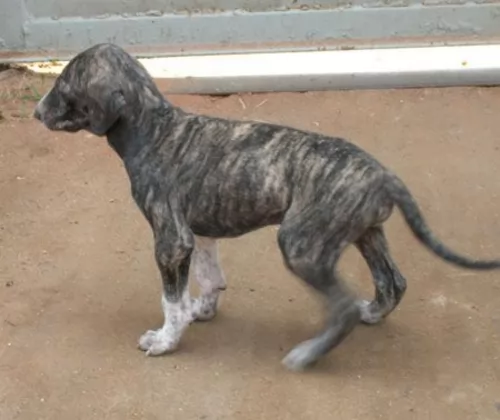 The Mudhol Hound is a good looking sight hound. Slender, sleek, muscular. They have narrow, long heads with a muzzle that tapers. They have long and powerful jaws with a large black nose. Their eyes are oval, large and brown with a look that pierces, and they have long, muscular, and clean shoulders. The legs are straight, long and strong with a broad, muscular, long back. Like most sight hounds when you seen them coming at you straight on, they have the appearance of being one dimensional.
The Mudhol Hound is a good looking sight hound. Slender, sleek, muscular. They have narrow, long heads with a muzzle that tapers. They have long and powerful jaws with a large black nose. Their eyes are oval, large and brown with a look that pierces, and they have long, muscular, and clean shoulders. The legs are straight, long and strong with a broad, muscular, long back. Like most sight hounds when you seen them coming at you straight on, they have the appearance of being one dimensional.
There are two types of coat and many acceptable colors. The coat can be silky on the tail, legs and ears or it can be completely smooth from head to toe. The coat can be grey, black, cream, red, fallow, and fawn. It can also be one of these colors and a small amount of shite blended it.
 The Sealyham is a dog that stands low to the ground and its height shouldn’t exceed 27 - 30cm and weight should be about 8 - 9kg.
The Sealyham is a dog that stands low to the ground and its height shouldn’t exceed 27 - 30cm and weight should be about 8 - 9kg.
The double coat is considered non-shedding and is wiry and weather resistant. It is nearly always white but can be fawn. They’ve got big heads with dark, deep set eyes. The ears are semi-erect, semi-floppy and the tail is usually docked.
Affectionately referred to as Sealy, there aren't too many of these little dogs left. At one time, they were a very popular terrier breed, but today they are uncommon – almost endangered.
He’s a social dog with his human family but tends to be reserved around strangers. He also tends to be just a little bit more mellow than some of the more rowdier terrier breeds.
He gets on well with other dogs in the home as well as with children. He is an intelligent little dog but is inclined to be stubborn so you have to show him both firmness and kindness and also think about obedience training for him.
He’s amicable and adjusts well to life in the city or the countryside.
 The Sealyham Terrier is such a robust little dog with a distinctive look.
The Sealyham Terrier is such a robust little dog with a distinctive look.
He can be stubborn but he loves his human family and is sociable and amicable with them, slotting in to their way of life. He can be a couch potato or an active outdoor dog – whatever is required of him and he makes and excellent, loving family pet and companion.
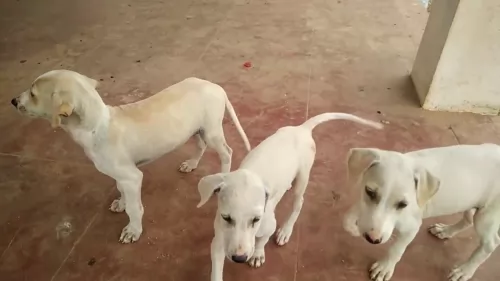 Like so many of the old breeds raised in a lot of isolation, the Mudhol is a very healthy breed. There are no genetic illnesses and they have a long line of dogs able to deal with the weather in India and avoid any sickness. However, they do have a few conditions they are prone to.
Like so many of the old breeds raised in a lot of isolation, the Mudhol is a very healthy breed. There are no genetic illnesses and they have a long line of dogs able to deal with the weather in India and avoid any sickness. However, they do have a few conditions they are prone to.
 This is a hardy dog breed and you don’t hear of many health problems associated with him. It seems as though you might have to watch out for an eye condition known as lens luxation. It's an eye condition with dogs where the lens slips out of position because of weakening of the fibers that hold it in place.
This is a hardy dog breed and you don’t hear of many health problems associated with him. It seems as though you might have to watch out for an eye condition known as lens luxation. It's an eye condition with dogs where the lens slips out of position because of weakening of the fibers that hold it in place.
There is a lack of fluid in the eye causing optic nerve damage and this can lead to blindness.
Retinal Dysplasia is another eye problem . This is a developmental malformation of the retina that the dog is born with. Symptoms in dogs are a reluctance to jump off things such as the bed or he may even bump into things.
Atopic Dermatitis is something the Sealyham is more prone to. Its an allergic skin disease which drives a dog mad with its itchiness. Your pet will certainly need treatment from the vet to relieve it.
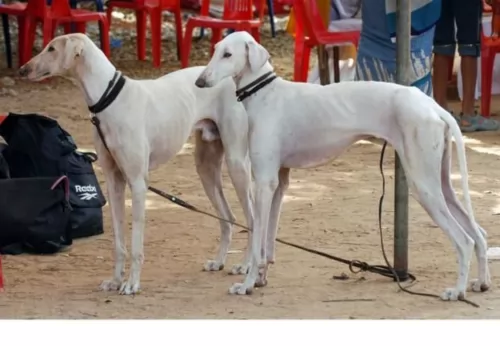 The Mudhol puppy needs a high quality dry food. They should eat three to four times a day in smaller portions. A total of 3 to 3.5 cups per day.
The Mudhol puppy needs a high quality dry food. They should eat three to four times a day in smaller portions. A total of 3 to 3.5 cups per day.
The adult Mudhol should eat about two and a half cups of high quality dry food twice a day. Do not overfeed the Mudhol and don’t let him run right after eating.
Outstanding speed and stamina
This is a high energy, active dog that needs a lot of space and exercise. She needs to be able to run freely as long as she wants at least a couple times a day. He has incredible endurance and a very high prey drive. They must be in a fenced area unless on a leash. They are great at lure coursing, fly ball and agility.
 Provide your Sealy with his own warm, dry bed.
Provide your Sealy with his own warm, dry bed.
Brush the long, weather-resistant coat at least twice a week. Hand-stripping of the coat will maintain the wiry, hard texture, but because this method can be quite a laborious process, many Sealy owners rather have their dog professionally clipped.
Check inside his mouth for bad teeth as well as inside the ears for signs of infection. His eyes should also be clear and free of discharge.
His nails will also need to be trimmed.
The Sealyham doesn’t require a lot of exercise but he must at least be given a walk every day.
Ensure the vaccines are up to date. They start when your pet is just a puppy. Remember to get your dog to the vet when you suspect that he is ill.
Feed your Sealyham with good food. Make sure you’re feeding your pet a high quality food as this promotes health and longevity. Provide your Santal Hound with top quality food to ensure his health.
Always choose the quality commercially manufactured foods on the market – those that have natural, good ingredients in them. Try to include some home-made food for him which can be simply mixed into the dry kibble twice a week.
There is no need to offer your dog a host of different foods. Dogs want simplicity and consistency. Boiled chicken, brown rice or pasta and spinach, sweet potatoes and carrots is super tasty and nutritious. If you can, also try and include a little bit of raw meat to his diet occasionally as this can go towards ensuring he doesn’t get skin diseases.
Make sure that a constant supply of fresh, cool water is available to your dog.